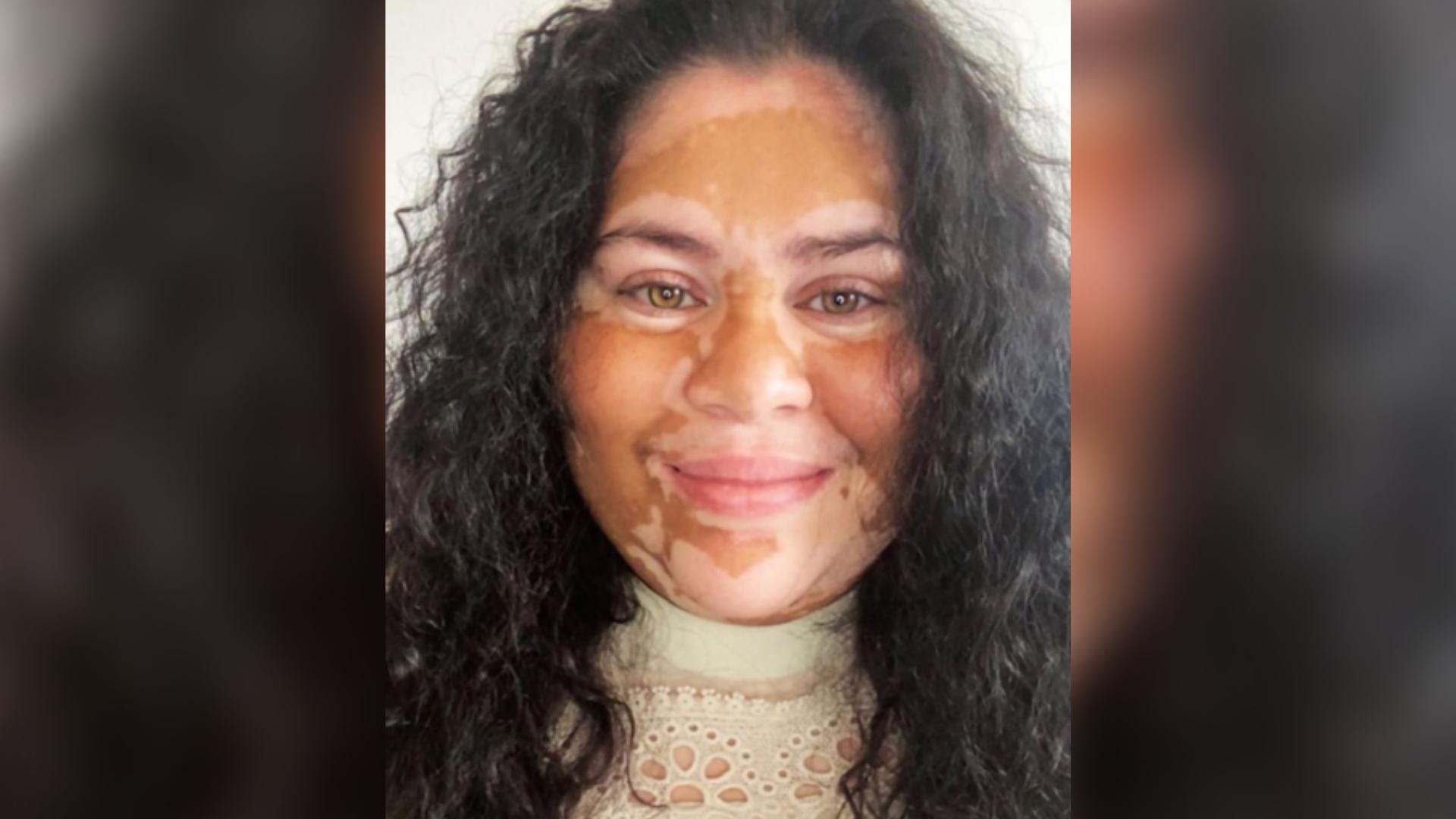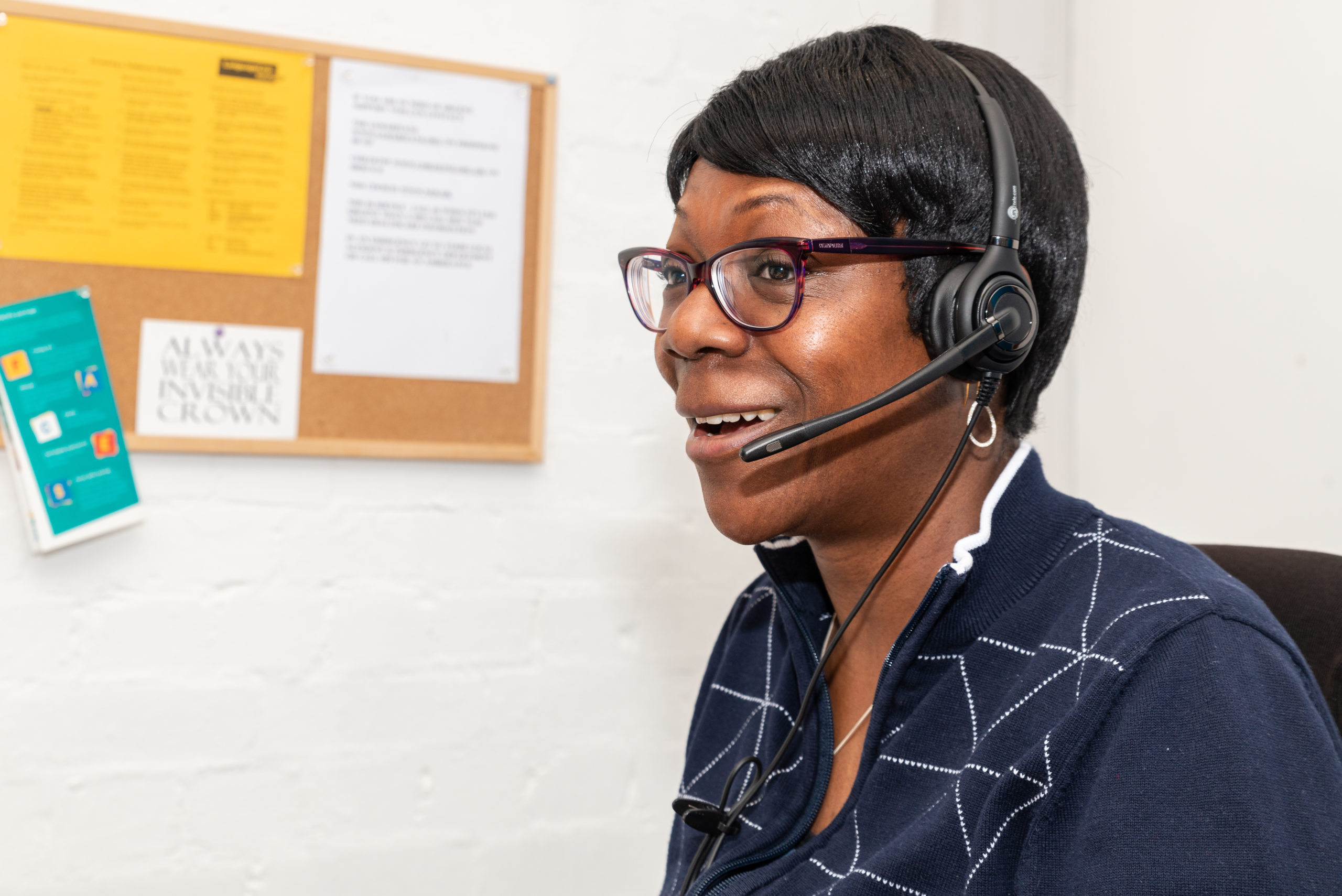I’m Angela, and I’m from London with SriLankan heritage. Growing up, I developed eczema, psoriasis and vitiligo. All three are autoimmune conditions on my skin and all three are types of visible differences.
When I was younger, my mum would oil and plait my long, thick hair. Around the age of 14, she noticed a white patch at the back of my neck beneath a spot of healing psoriasis. At first we thought nothing of it. But soon we noticed that wherever my psoriasis or eczema patch healed, a patch of white skin was revealed underneath. We soon learnt it was vitiligo.
Growing up, my dad had vitiligo too. He acquired it after he got married but it never stuck out to me because I don’t remember a time he didn’t have it. I never noticed it on him. I’d always seen past it – I just saw my dad. When it started developing on my body, though, it was all I could see on myself.
Developing vitiligo at age 14 was tough. It’s an age where teenagers become more aware of their body image and feel more anxious about its changes and development. Adding vitiligo to the mix was extremely difficult. The most difficult part was the lack of control I felt. I didn’t know whether it would spread, or how quickly.
As it spread around my body, I felt embarrassed and even ashamed of what I looked like. I was constantly looking for ways to cover it up and hide it. No matter the weather, I wore long sleeves and leggings or tights to cover up every area of skin I possibly could. The thought of someone seeing my skin scared me more than knowing that being fully covered up all the time would irritate my psoriasis.
It’s taken me a long time to get used to living with vitiligo. Even now I’m still working towards feeling fully confident in my own skin.
Then began the countless doctor’s appointments and searching for cures. My doctor told me that there wasn’t much that could be done. I was prescribed steroid creams and tablets to encourage re-pigmentation.
When that didn’t work, my parents took me to see various homeopathic and Ayurvedic doctors – practitioners who use theories and techniques developed thousands of years ago in India. I even tried Chinese herbal medicine and herbalists in Sri Lanka over the summer holidays, who recommended that I stayed in the country and expose myself to more sun across a longer period of time.
The final attempt was a GP referral to a hospital, to receive PUVA treatment – an ultraviolet light treatment for skin conditions, and phototherapy. The risks of these treatments was explained and we were happy to proceed – as we believed that this was my last hope of becoming “normal” again. The treatments weren’t easy. I took tablets that made me sensitive towards light and had to attend hospital nearly every day. On top of this, I had to wear sunglasses for the whole day to avoid sunlight on the days of my treatment. I was always trying to avoid unwanted attention, part of the reason I was receiving this treatment, but this was increasingly difficult when I had to wear sunglasses throughout rain and even snow!
It was a lonely time and I felt very isolated as I tried to navigate treatment with low self-esteem and anxiety. Being from an Asian background, it felt difficult to hide away from the limelight – especially at weddings and parties. I couldn’t even forget about my skin for a moment without someone coming and pointing it out. Unhelpful comments like “you’ve got the same skin ‘problem’ as your father, haven’t you?” “what are you doing about it?”, “you’re going to be all white soon” and “have you tried…”.
The one that really got me was “Oh you poor thing. You’re so brave!” It felt patronising. It wasn’t like I had a choice to be brave.
I often wished that I would go to sleep and wake up and be all “normal.” Fortunately, my confidence started to build as I reached my late teens.

Images of Angela by Jack Powley Photography and Ethicco Photography.
Moving away from home for the first time, to settle at university in Birmingham, was overwhelming at first. But there was nothing to be worried about. My skin wasn’t being pointed out, nor questioned by those around me. I started making new friends who saw past my skin and actually saw me as me. I started to feel more confident and comfortable.
Life felt vibrant and my confidence was growing, until an unforgettable event during the summer holidays after my first year of university.
I was at my cousin’s wedding in Sri Lanka. Nearing the end of my stay, I learnt that certain members of my family were trying to set me up with an arranged marriage. I was livid. I was 18 at the time – I felt like my life was just getting started. I can safely say that all hell broke loose, particularly when I was told “you need to get married now, while your skin isn’t so bad. No one will want to marry you in a few years when your skin ‘disease’ gets worse.”
Marriage is a big part of the Asian community. Like most girls, growing up, I always imagined meeting someone, getting to know them, falling in love and getting married – in that order.
To be told this by my family knocked every bit of confidence and hope I had gained over the last few months right out of me. I was back at the beginning again. I was distraught to think of the kind of burden I seemed to be to others. Dark thoughts clouded over me. I didn’t want to cause my parents more stress by asking for help, I knew that this wasn’t their plan for me, but they worried about me so much and didn’t want me to end up being lonely.
The whole experience was traumatic for me. I honestly thought that I was going to be lonely and that no one would want me because I didn’t perceive myself as normal.
But, guess what? I did find someone, fall in love, and ended up marrying them. I met my husband when I was in Birmingham. He was just a friend when I went through my traumatic experience. He was the first one I told about what I was going through and how I felt. He was there for me and made me feel worthy. Eventually we became an item, and 18 years later we’re still together!
I lost a lot of years hiding and covering up which I can never get back.
It’s taken me a long time to get used to living with vitiligo. Even now I’m still working towards feeling fully confident in my own skin. I have good days where I don’t feel bothered about what people think and I have bad days where I isolate myself and wonder why I have vitiligo. It really isn’t easy.
As my vitiligo has taken up most of my body now, people can be shocked to find out I’m Sri Lankan. At one point, I feared that I was losing my identity as my skin was changing and no one would know or realise that I am Sri Lankan or of a darker complexion. I was scared that I was losing myself. But, I know my true identity and when I really think about it, vitiligo has become a part of my identity, of who I am. Given the rollercoaster of emotions I’ve been through from seeing, hiding, accepting and now exposing my vitiligo, I can’t imagine what or even who I’d be without it.
In 2019, I was asked to model for a large campaign run by the Vitiligo Society. I walked around Southbank with no make-up, no sleeves and no tights on to cover my vitiligo! I was so anxious on the short walk from my car to the meeting point – I was literally shaking.
When I arrived at the meeting point, I was welcomed by other beautiful individuals who all embraced their vitiligo. We walked along the Southbank having our photos taken which was an amazing experience that I thoroughly enjoyed. I had never felt so liberated in all my life! Is this what it felt like to be normal? I felt so comfortable and realised that I can flaunt my skin and serve a purpose.
This was definitely a turning point in my vitiligo journey. I now knew that I wanted to create more awareness about vitiligo and be able to feel free more often. I put myself forwards for another shoot and realised that this was something I really enjoyed. I have since been signed to a talent agency as a model who has vitiligo.
I feel I have come a long way from when my vitiligo started. I’d never thought I would ever expose my skin in public, let alone model and share photos of me with no make-up on social media. It definitely wasn’t easy, but it did get easier.
I lost a lot of years hiding and covering up which I can never get back. But I have learnt that what you see as your weakness today is definitely going to be your strength tomorrow. Be yourself, be carefree and enjoy life.

